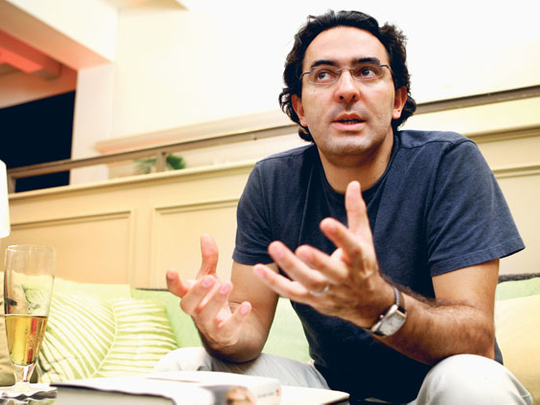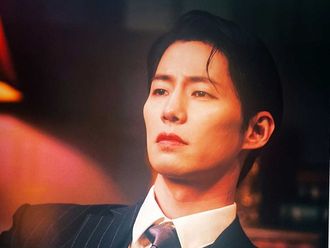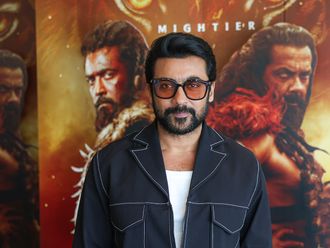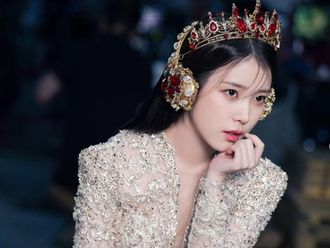
There is a museum in downtown Bogotá, Colombia's drizzly capital, where a lawyer's pinstripe suit stands on display in a glass case — pristine but for two bullet holes in the back. It belonged to Jorge Eliécer Gaitán, a liberal presidential candidate whose assassination in April 1948 sparked the Bogotázo, riots that set the city on fire. The riots ushered in ten years of bloodletting between liberal and conservative sympathisers and, as peasants formed guerrilla movements, spawned the ensuing decades of South America's longest-running civil war.
For Juan Gabriel Vásquez, among the most inventive and erudite of Colombia's emerging generation of novelists, the assassination was the "defining episode of our history — our own JFK". Those gunshots were "our coming of age — when Colombia was welcomed into the Cold War. And we still haven't got to the bottom of it; nobody knows who killed Gaitán."
Novelists leapt into the breach, "while the bodies were still falling" in the 1940s and 1950s. But Colombia's most famous writer, Gabriel García Márquez — in the capital during the riots — dismissed them as a crude "inventory of dead people", crafted without art. "He complained writers hadn't taken the time to learn how to write novels," Vásquez says. "It's not enough to have the material; you have to have the narrative strategy, or you fail."
A lesson in writing
Vásquez, 37, has taken that lesson to heart. His talk bristles with quotations from writers he has ingested, rather as, in his words, the Nobel laureate from Aracataca "hired and fired" Faulkner and Hemingway. Good writers, Vásquez believes, "control their own influences — it's not involuntary".
Hailing from an urban landscape of skyscrapers and mountain mist, he found the ruses that conjured the sweltering Caribbean plantations of Macondo were no use to him. He chose mentors in Joyce, Philip Roth, Saul Bellow. Joseph Conrad was key, particularly "his obsessive idea that novels go into dark places and come back with the news. It's not necessarily geographical," he says, "but shedding light on dark places of the soul."
The Informers (2004), published in a translation by Anne McLean in 2008, nods to Conrad's Under Western Eyes and The Secret Agent. A morally complex thriller set in the late Eighties and Nineties in Colombia, it looks back to the Forties and the Second World War, when the government unjustly interned German nationals on the basis of murky blacklists and spying, during a period of zealous realignment with Washington. One character plagiarises Gaitán's speeches, while, for a Jewish refugee, the Bogotázo riots are a terrifying echo of Kristallnacht. Vásquez's interest is in exploring "dark corners of Colombian history that have made us what we are now". He was named one of the Bogotá 39 — Latin America's top writers under 40 — when the city was Unesco world book capital in 2007.
The Secret History of Costaguana, orginally published in 2007 and recently by Bloomsbury in translation, is a humorous, picaresque novel of adventure and a knowing take on a family saga. Set in 19th- and early 20th-century Colombia and London, it probes the political intrigue that mired the building of the Panama canal, complete with financial crash and intervention by the United States. But it is posed as a bitter, playful riposte to Conrad's Nostromo.
Vásquez was born in 1973 and had a "wild, rural upbringing" on the northern outskirts of Bogotá. His father was a lawyer (as is his younger sister), who expected him to join his law firm, though "he couldn't complain — he had force-fed me novels". During the World Cup in Spain when he was 9 and "football was my life", his father paid him to translate a biography of Pelé into Spanish: "It nourished my relationship with books and the English language." He went to Bogotá's Anglo-Colombian school, then did a law degree at Bogotá university but was already set on a literary career.
It struck him recently that he grew up in tandem with the drug wars. Increasingly harsh American laws "built the drug business". His adolescence coincided with the most violent period of the 1980s and early 1990s, when rival cartels fought the state with terrorism.
He left Bogotá not only to escape a violent city but to write, living in France and Belgium and, when he married in 1999, moving to Spain. Studying Latin American literature at the Sorbonne, he wrote two novels that he more or less disowns.
Literary boom
Barcelona was the engine of the 1960s boom, when books by Latin Americans were published in Spain and exported, making them accessible for the first time outside their own countries. Vásquez reveres the late Catalan publisher Carlos Barral as "the first to recognise what young Latin Americans were doing".
Vásquez's Costaguana identifies the origins of the split between liberals and conservatives in a 19th-century battle between anticlericals and obscurantists, at a time of a thriving free press and a democratic constitution. "If historical novels don't comment on the present, I don't see the point," he says.
Since 2007 Vásquez has written a weekly column for the Colombian newspaper El Espectador and finds political debate "addictive: A novel is about asking questions but as a columnist you love certainty".
Those Colombian readers who congratulate Vásquez on avoiding the topic that most soils their image ("I smile and say, ‘thank you'") may be in for a shock. His next novel will be a "private history of drugs". "Narco-realists" such as Fernando Vallejo, whose Our Lady of the Assassins depicted a teenage sicario — an assassin for a cartel — have tackled the trade head-on. But Vásquez wants a larger canvas and to "rescue the narrative of the drug wars from cheap melodrama and simplistic Hollywood films". His ambition will be to show "how the drug trade affects somebody not involved in it; somebody who — like me — has never seen a gram of coke in his life".








